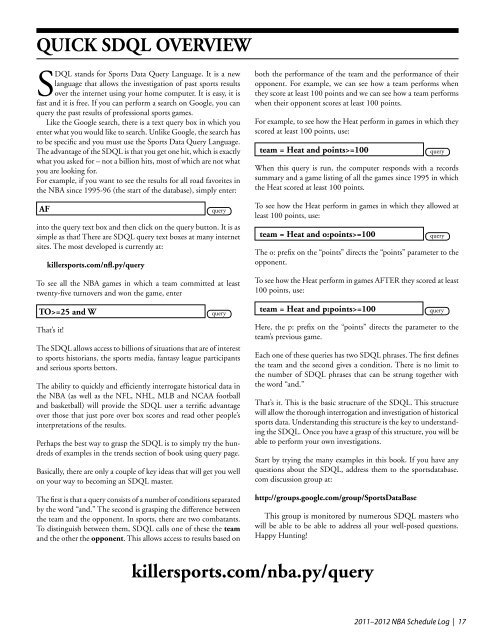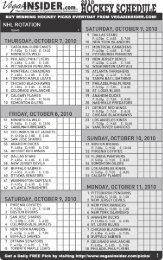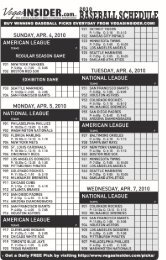Create successful ePaper yourself
Turn your PDF publications into a flip-book with our unique Google optimized e-Paper software.
QUICK SDQL OVERVIEW<br />
SDQL stands for Sports Data Query Language. It is a new<br />
language that allows the investigation of past sports results<br />
over the internet using your home computer. It is easy, it is<br />
fast and it is free. If you can perform a search on Google, you can<br />
query the past results of professional sports games.<br />
Like the Google search, there is a text query box in which you<br />
enter what you would like to search. Unlike Google, the search has<br />
to be specific and you must use the Sports Data Query Language.<br />
The advantage of the SDQL is that you get one hit, which is exactly<br />
what you asked for – not a billion hits, most of which are not what<br />
you are looking for.<br />
For example, if you want to see the results for all road favorites in<br />
the <strong>NBA</strong> since 1995-96 (the start of the database), simply enter:<br />
AF query<br />
into the query text box and then click on the query button. It is as<br />
simple as that! There are SDQL query text boxes at many internet<br />
sites. The most developed is currently at:<br />
killersports.com/nfl.py/query<br />
To see all the <strong>NBA</strong> games in which a team committed at least<br />
twenty-five turnovers and won the game, enter<br />
TO>=25 and W query<br />
That’s it!<br />
The SDQL allows access to billions of situations that are of interest<br />
to sports historians, the sports media, fantasy league participants<br />
and serious sports bettors.<br />
The ability to quickly and efficiently interrogate historical data in<br />
the <strong>NBA</strong> (as well as the NFL, NHL, MLB and NCAA football<br />
and basketball) will provide the SDQL user a terrific advantage<br />
over those that just pore over box scores and read other people’s<br />
interpretations of the results.<br />
Perhaps the best way to grasp the SDQL is to simply try the hundreds<br />
of examples in the trends section of book using query page.<br />
Basically, there are only a couple of key ideas that will get you well<br />
on your way to becoming an SDQL master.<br />
The first is that a query consists of a number of conditions separated<br />
by the word “and.” The second is grasping the difference between<br />
the team and the opponent. In sports, there are two combatants.<br />
To distinguish between them, SDQL calls one of these the team<br />
and the other the opponent. This allows access to results based on<br />
both the performance of the team and the performance of their<br />
opponent. For example, we can see how a team performs when<br />
they score at least 100 points and we can see how a team performs<br />
when their opponent scores at least 100 points.<br />
For example, to see how the Heat perform in games in which they<br />
scored at least 100 points, use:<br />
team = Heat and points>=100 query<br />
When this query is run, the computer responds with a records<br />
summary and a game listing of all the games since 1995 in which<br />
the Heat scored at least 100 points.<br />
To see how the Heat perform in games in which they allowed at<br />
least 100 points, use:<br />
team = Heat and o:points>=100 query<br />
The o: prefix on the “points” directs the “points” parameter to the<br />
opponent.<br />
To see how the Heat perform in games AFTER they scored at least<br />
100 points, use:<br />
team = Heat and p:points>=100 query<br />
Here, the p: prefix on the “points” directs the parameter to the<br />
team’s previous game.<br />
Each one of these queries has two SDQL phrases. The first defines<br />
the team and the second gives a condition. There is no limit to<br />
the number of SDQL phrases that can be strung together with<br />
the word “and.”<br />
That’s it. This is the basic structure of the SDQL. This structure<br />
will allow the thorough interrogation and investigation of historical<br />
sports data. Understanding this structure is the key to understanding<br />
the SDQL. Once you have a grasp of this structure, you will be<br />
able to perform your own investigations.<br />
Start by trying the many examples in this book. If you have any<br />
questions about the SDQL, address them to the sportsdatabase.<br />
com discussion group at:<br />
http://groups.google.com/group/SportsDataBase<br />
This group is monitored by numerous SDQL masters who<br />
will be able to be able to address all your well-posed questions.<br />
Happy Hunting!<br />
killersports.com/nba.py/query<br />
2011–2012 <strong>NBA</strong> <strong>Schedule</strong> <strong>Log</strong> | 17










